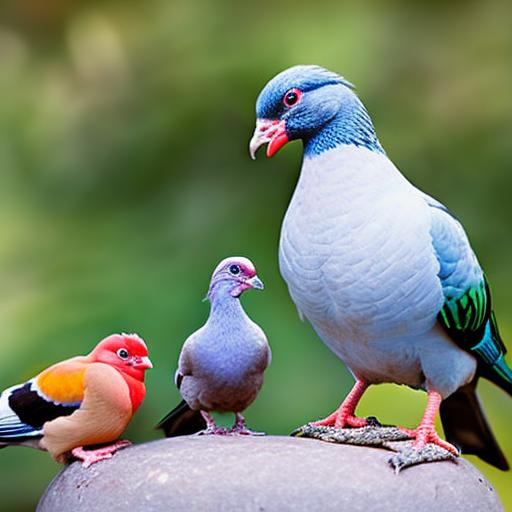Keeping chickens and pigeons together is a growing trend among backyard farmers. It offers a range of benefits, including mutual pest control and fertilization. While chickens are known for their ability to control insects and provide nutrient-rich manure, pigeons are excellent at keeping away rodents and other pests. This combination of skills makes them a perfect match for each other.
Key Takeaways
- Keeping chickens and pigeons together can be a great way to maximize space and resources.
- Chickens and pigeons have different behaviors and needs, but can coexist peacefully with proper management.
- Factors to consider before keeping chickens and pigeons together include space, predator control, and zoning regulations.
- Housing requirements for chickens and pigeons should provide separate areas for roosting and nesting.
- Feeding requirements for chickens and pigeons should be tailored to each species’ specific needs.
Benefits of Raising Chickens and Pigeons Together
One of the main benefits of keeping chickens and pigeons together is their ability to help each other in terms of pest control and fertilization. Chickens are natural insect hunters and will happily eat any bugs they come across. This can help keep the population of pests in your garden under control. Pigeons, on the other hand, are excellent at keeping away rodents and other pests that may be attracted to the chicken feed.
In addition to pest control, chickens and pigeons can also benefit each other in terms of fertilization. Chickens produce nutrient-rich manure that can be used as fertilizer for your garden. Pigeons, on the other hand, produce guano, which is also a valuable source of nutrients for plants. By keeping chickens and pigeons together, you can create a closed-loop system where the waste from one animal becomes food for the other.
Understanding the Behaviour of Chickens and Pigeons
Chickens and pigeons have different behaviours that need to be managed when kept together. Chickens are social animals that thrive in groups, while pigeons are more solitary creatures. It’s important to provide enough space for both species to ensure they can live comfortably together.
Chickens are known for their scratching behaviour, which can cause damage to plants and gardens. To manage this behaviour, it’s important to provide them with plenty of space to roam and scratch. You can also create designated areas for them to scratch, such as a designated garden bed or a sandbox.
Pigeons, on the other hand, are known for their homing instinct and may try to return to their original location if they are moved. It’s important to keep this in mind when introducing new pigeons to your flock. Give them time to adjust to their new surroundings and provide them with a safe and secure space where they can feel comfortable.
Factors to Consider Before Keeping Chickens and Pigeons Together
Before keeping chickens and pigeons together, there are several factors that need to be considered. One of the most important factors is space requirements. Chickens require a minimum of 4 square feet per bird in the coop and 10 square feet per bird in the run. Pigeons, on the other hand, require a minimum of 2 square feet per bird in the coop and 8 square feet per bird in the aviary.
Another factor to consider is the compatibility of different breeds. Some chicken breeds may be more aggressive towards pigeons, while others may be more tolerant. It’s important to choose chicken breeds that are known for their calm and docile nature when keeping them with pigeons.
Legal considerations are also important when keeping chickens and pigeons together. Some areas may have restrictions on keeping certain types of birds or may require permits. It’s important to check with your local authorities before starting your flock.
Housing Requirements for Chickens and Pigeons
When it comes to housing requirements, both chickens and pigeons have specific needs that need to be met. For chickens, a secure coop is essential to protect them from predators and provide them with a safe place to roost at night. The coop should have proper ventilation, nesting boxes, and perches for the chickens to sleep on.
Pigeons, on the other hand, require an aviary or loft where they can fly and roost. The aviary should be spacious enough to allow the pigeons to fly and should have perches for them to rest on. It’s also important to provide nesting boxes for the pigeons to lay their eggs.
In terms of safety, it’s important to ensure that both the chicken coop and pigeon aviary are secure and predator-proof. This can be achieved by using sturdy materials, such as wire mesh, and ensuring that there are no gaps or holes where predators can enter.
Feeding Requirements for Chickens and Pigeons

Chickens and pigeons have different dietary needs that need to be met in order for them to stay healthy. Chickens require a balanced diet that includes a mix of grains, protein, fruits, and vegetables. They also require access to fresh water at all times.
Pigeons, on the other hand, have a more specialized diet that consists mainly of grains and seeds. They also require access to fresh water at all times. It’s important to provide a variety of grains and seeds to ensure that they are getting all the nutrients they need.
When keeping chickens and pigeons together, it’s important to ensure that both species have access to their specific food requirements. This can be achieved by providing separate feeding areas or by using feeders that are designed for both chickens and pigeons.
Health Concerns When Keeping Chickens and Pigeons Together
When keeping chickens and pigeons together, there are several health concerns that need to be addressed. One of the most common health issues is the spread of diseases between the two species. Chickens are susceptible to diseases such as avian influenza and coccidiosis, while pigeons can carry diseases such as salmonella and ornithosis.
To prevent the spread of diseases, it’s important to practice good biosecurity measures. This includes keeping the coop and aviary clean and disinfecting them regularly. It’s also important to quarantine new birds before introducing them to the flock to ensure that they are healthy.
Regular health checks are also important when keeping chickens and pigeons together. This includes checking for signs of illness, such as changes in behavior or appearance, and seeking veterinary care if necessary.
Managing the Flock: Tips for Keeping Chickens and Pigeons Together
Managing a flock of chickens and pigeons requires careful planning and attention to detail. One of the most important tips is to establish a daily routine for feeding, cleaning, and checking on the birds. This will help ensure that their needs are met and that any issues can be addressed in a timely manner.
It’s also important to provide plenty of enrichment for both chickens and pigeons. This can include things like perches, toys, and access to natural materials such as branches and grass. Enrichment helps keep the birds mentally stimulated and prevents boredom.
Regular observation is also important when keeping chickens and pigeons together. This includes watching for signs of aggression or stress and taking steps to address any issues that arise. It’s also important to monitor the health of the birds and seek veterinary care if necessary.
Common Problems When Keeping Chickens and Pigeons Together
When keeping chickens and pigeons together, there are several common problems that can arise. One of the most common issues is aggression between the two species. Chickens may peck at pigeons or try to chase them away from their food. To address this issue, it’s important to provide enough space for both species and to ensure that they have separate feeding areas.
Another common problem is the spread of diseases between chickens and pigeons. As mentioned earlier, both species can carry diseases that can be harmful to each other. To prevent the spread of diseases, it’s important to practice good biosecurity measures and to seek veterinary care if necessary.
Is Keeping Chickens and Pigeons Together Right for You?
Keeping chickens and pigeons together can offer a range of benefits, including mutual pest control and fertilization. However, it also requires careful planning and attention to detail. Before deciding to keep chickens and pigeons together, it’s important to consider factors such as space requirements, compatibility of breeds, and legal considerations.
If you have the space and resources to accommodate both chickens and pigeons, keeping them together can be a rewarding experience. It allows you to create a closed-loop system where the waste from one animal becomes food for the other. It also provides natural pest control for your garden and can help reduce the use of chemical pesticides.
However, it’s important to be prepared for the challenges that come with keeping chickens and pigeons together. This includes managing their behaviour, providing appropriate housing and feeding requirements, and addressing any health concerns that may arise. By taking these factors into consideration, you can make an informed decision about whether keeping chickens and pigeons together is right for you and your flock.
If you’re considering keeping chickens and pigeons together, you may also be interested in learning about the benefits of having a garden chicken coop. This article from Poultry Wizard provides valuable insights into creating a safe and comfortable environment for your chickens while utilizing your garden space efficiently. Discover how to design a coop that not only meets the needs of your feathered friends but also enhances the aesthetics of your backyard. To read more about it, check out this informative article on poultrywizard.com.
FAQs
What are the differences between chickens and pigeons?
Chickens are domesticated birds that are commonly raised for their meat and eggs, while pigeons are often kept as pets or for racing. Chickens are larger and more social than pigeons, while pigeons are more agile and have better flying abilities.
Is it possible to keep chickens and pigeons together?
Yes, it is possible to keep chickens and pigeons together, but it is not recommended. Chickens and pigeons have different needs and behaviors, and keeping them together can lead to stress, aggression, and disease transmission.
What are the risks of keeping chickens and pigeons together?
Keeping chickens and pigeons together can increase the risk of disease transmission, as they can carry different types of bacteria and viruses. Chickens may also peck at pigeons, causing injury or stress. Pigeons may also steal food from chickens, leading to malnutrition.
What are the benefits of keeping chickens and pigeons together?
There are no significant benefits to keeping chickens and pigeons together. They have different needs and behaviors, and keeping them together can lead to stress, aggression, and disease transmission.
What should I consider before keeping chickens and pigeons together?
Before keeping chickens and pigeons together, you should consider their different needs and behaviors. Chickens require a coop and run for shelter and exercise, while pigeons need a loft for nesting and flying. You should also consider the risk of disease transmission and the potential for aggression between the two species. It is recommended to keep them separate to ensure their health and well-being.
Meet Walter, the feathered-friend fanatic of Florida! Nestled in the sunshine state, Walter struts through life with his feathered companions, clucking his way to happiness. With a coop that’s fancier than a five-star hotel, he’s the Don Juan of the chicken world. When he’s not teaching his hens to do the cha-cha, you’ll find him in a heated debate with his prized rooster, Sir Clucks-a-Lot. Walter’s poultry passion is no yolk; he’s the sunny-side-up guy you never knew you needed in your flock of friends!







